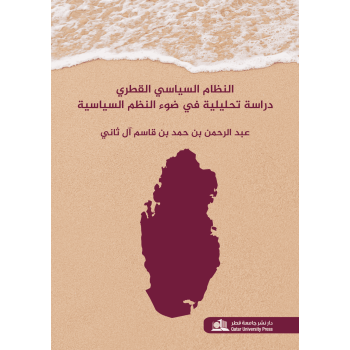النظام السياسي القطري - دراسة تحليلية في ضوء النظم السياسية
يعدّ هذا الكتاب تأصيلًا لنظرية الدولة، والسيادة، والسلطة السياسية، في النظم السياسية والفقه الإسلامي، وتحليلًا لمبدأ الفصل بين السلطات، وما ترتّب عليه من نشأة أنظمة سياسية رئاسية وبرلمانية وشبه رئاسية، مع التركيز على النظامين البرلماني والرئاسي؛ حيث يتناول الكتاب النظام السياسي لدولة قطر منذ تأسيسها، مبيّنًا الأسس التاريخية لسيادتها في ضوء النظم السياسية الوضعية والفقه الإسلامي. كما يتعرض الكتاب لبيان ماهية النظام الدستوري في الدولة في ضوء النظام الأساسي المؤقت لعام 1970، مرورًا بالنظام الأساسي المؤقت المعدل لعام 1972، وانتهاءً بالدستور الدائم لعام 2004. يستعرض الكتاب سلطات حضرة صاحب السمو الأمير واختصاصاته وصلاحياته، وولاية العهد في دولة قطر، بحسبانها الطريق الطبيعي لانتقال الحكم فيها. كما يتناول علاقة المؤسسات الدستورية في الدولة بالأمير واختصاصاتها؛ المتمثلة في مجلس الوزراء بوصفه الجهاز المعاون لسمو الأمير في رسم السياسة العامة للدولة وتنفيذها، ومجلس الشورى الذي يتولى السلطة التشريعية واختصاصاته الدستورية التشريعية والرقابية، ثم المحاكم التي تتولى السلطة القضائية واختصاصاتها بالفصل في المنازعات المدنية والإدارية.
This book lays a special emphasis on a number of fundamental concepts in political systems and Islamic Jurisprudence such as theory of the State, sovereignty, and political powers. Moreover, it sheds light on the principle of the separation of powers, which led eventually to the emergence of presidential, parliamentary and semi-presidential political systems. The book further explores the political system of the State of Qatar since its establishment along with the historical foundations of its sovereignty in light of political systems and Islamic jurisprudence. It also examines the constitutional system of Qatar in light of the Provisional Basic Law of 1970, the Amended Provisional Basic Law of 1972, and then the Permanent Constitution of 2004. Additionally, the book emphasizes the powers, competencies, and authorities of His Highness the Amir and the appointment of the Crown Prince as being the normal path for the transfer of power in the State of Qatar. It finally investigates the Amir's relationship with other constitutional authorities in the State; such as the Cabinet, which is tasked with assisting His Highness the Amir in drawing up and implementing the general policy of the State; the Shura Council, which assumes the legislative authority and its constitutional, legislative and oversight powers; then, the courts which assume the judicial power and their authority to adjudicate civil and administrative disputes.

